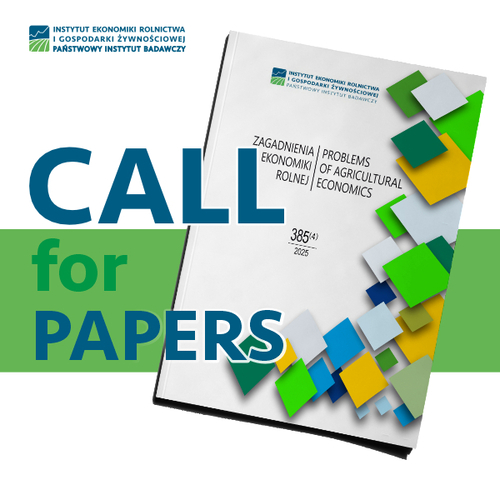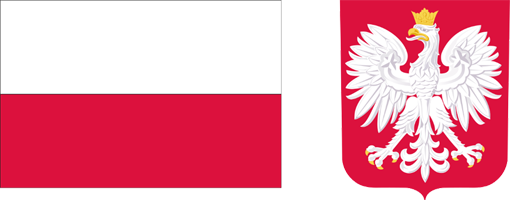Current issue
Archive
About the Journal
Aims and Scope
Editorial Board/Editorial Team
List of reviewers
Publishing process
Publishing Ethics and Malpractice Statement
Personal data protection (GDPR)
Creative Commons License
CrossRef Member / Similarity Check
For Authors
Call for papers
Guidelines for authors
Submitting a manuscript through the editorial system – step by step
For Reviewers
Peer review process
Guidelines for reviewers
Submitting a review – step by step
Contact
Publishing Ethics and Malpractice Statement
Publishing ethics of the ''Zagadnienia Ekonomiki Rolnej / Problems of Agricultural Economics''
The journal adheres to the principles on publication ethics according to the guidelines designed by the Committee on Publication Ethics (COPE). All members of the editorial team of the ''Zagadnienia Ekonomiki Rolnej / Problems of Agricultural Economics'', within the scope of their respective duties, are committed to keep high scientific and ethical standards and undertake all possible steps to avoid negligence. Papers, submitted to the quarterly, are assessed by editors and reviewers as regards reliability, ethical standards and contribution to the development of science.
Publication ethics for members of the editorial team
Criteria and responsibility for publication of papers
Decisions on publication of papers are taken by the editor-in-chief in consultation with the subject editor. The decisions of both editors are taken on the basis of indications and detailed assessment of at least two reviewers of the paper, independent and anonymous for the author. Depending on the needs, the opinion of the journal’s Editorial Board is also taken into account. The decision is taken bearing in mind the risk of possible libel of third parties, breach of copyrights and other intellectual property rights, plagiarism or self-plagiarism and doubts concerning the authorship or co-authorship of a paper, termed as ghostwriting and guest authorship .
Fair play
Papers sent to the editorial office are assessed based on content-related criteria and publication ethics. The assessment is not affected by personal factors, such as sex, faith, race, origin, nationality or political beliefs of authors.
Confidentiality
Members of the editorial team are not allowed to disclose any information on the papers submitted for publication to other people than – at respective stages of the publication procedure – authors, selected reviewers, authorised editors and representatives of the publisher.
Preventing conflicts of interest between editorial team members
Papers that were not published cannot be used by members of the editorial team in part or in whole without written consent of their authors.
Preventing and handling research misconduct
Editors are obliged to act if they suspect or were reported about research misconduct, such as fabrication, falsification or plagiarism, with regard to both published and unpublished manuscripts.
In order to identify and prevent the publication of manuscripts in which research misconduct has occurred, the Managing Editor verifies the submitted manuscript using a plagiarism checker (Similarity Check). In the case of detecting any similarities between a submission and content existing in the database of the text comparison tool (iThenticate), the similarity report is analysed and the author is requested to make appropriate corrections to the text and clarify the situation. If the author fails to provide corrections and/or clarifications or refuses to do so, the Executive Editor makes a decision to reject the paper in the editorial system and the paper is not published in the journal. The author is notified thereof by the editorial system and by e-mail.
Having received information on suspected research misconduct in an already published paper, the Executive Editor investigates the allegations. If the allegations are substantiated, the Editor contacts the author and demands an explanation and appropriate corrections. If the explanation is satisfactory, they discuss the conditions on which the corrected version will be published. However, if there is no satisfactory clarification or there is no reaction form the author, the Executive Editor makes a decision to retract the controversial paper and informs the author about it. In both cases, the readers are informed of the situation by placing a disclaimer and official apologies on the website.
Subsequently, the Editor in Chief notifies the author’s superiors and public authorities of committing an offense. In the case of plagiarism, the Editor in Chief should also alert the publishing house which published the manuscript containing the plagiarized passages.
Publication ethics for reviewers
Participation of reviewers in editorial works
The reviewers are tasked with providing support to editors in decisions on approval for publication, sending back for corrections or rejection of a paper. Opinions on the issue should be univocal.
Promptness
Reviews shall be submitted on a deadline agreed in advance. If the reviewer is in conflict of interest or because of other reasons cannot review the paper or meet the deadline for review – the reviewer shall be obliged to immediately inform the editorial office on the fact.
Confidentiality
Papers received from the editorial office are confidential. It is unacceptable to disclose them to third parties or to discuss with them the contents or conclusions of the papers – except for an authorised representative of the editorial team. The reviews are anonymous, which means that the authors do not know the identity of the reviewers of their papers and reviewers should not know the identity of the authors. Reviewers are not allowed to disclose information on receipt of specific papers for review to any persons from outside the editorial team.
Preventing conflicts of interest
Papers received for review cannot be used by reviewers, in part or in whole, for personal gain. In case of conflicts of interests reviewers have to immediately inform the editorial office on the fact.
Preventing and handling research misconduct
Reviewers must immediately alert the Editorial Team of an alleged research misconduct and communicate any doubts or reservations concerning the originality of the submitted manuscript. In such situation, both review and publishing processes are withheld and an investigation is pursued. If the investigation shows no misconduct, the Executive Editor contacts the reviewers and explains the situation to them. If the allegations are substantiated, the Editor contacts the author and demands an explanation and appropriate corrections.
Reliability of sources
In the review, the reviewers have to identify and indicate the sources that the authors failed to mention, although they should have. The reviewers have to also inform the editorial staff on a significant similarity, partial overlapping of the reviewed work with other publications, regardless of the author, or possibly on other unauthorised borrowings and suspected plagiarism.
Publication ethics for authors
Authorship of a paper
All persons mentioned as authors or co-authors should have a key share in the paper preparation, significantly contributing to its elaboration from the stage of idea to the concept and execution and drawing conclusions. Other persons that could have an impact on some important aspects of the paper can be mentioned as collaborators but not co-authors of the paper. Ghostwriting and guest authorship are a manifestation of scientific misconduct, are unethical and illegal. Identified manifestations of such misconduct shall be publically disclosed by the editorial office and communicated to respective entities, especially parent institutions of the authors and alleged authors. An author submitting a paper shall also be obliged to make sure that all of the persons mentioned as co-authors approve of the final version of the paper.
Preventing conflicts of interest
The authors reveal in their paper all sources of project funding, contribution of institutions, organisations and other entities or other reasons for conflict of interest, which could have affected the interpretation or conclusions following from the paper.
Reliable presentation of research reports
Authors, presenting in their papers the results of empirical research, shall be obliged to reliably describe the performed research works and objectively interpret results. Data forming the grounds for the key conclusions should be presented in enough detail to allow for identification of data sources, to make it possible to repeat the research, if needed. Intentional inaccurate or unreliable presentation, commenting and interpretation of data and research results is unethical and illegal. The authors should be prepared to provide unprocessed source data for the needs of review for a year after the publication.
Paper originality
The authors present for publication solely their own original papers, unpublished before, in whole or in vital parts, in any authorship composition. The authors guarantee that the paper submitted for review was not submitted for publication in any other journal, joint paper or any other publication. The authors are obliged to inform the editorial team on the degree of originality in a relevant statement.
Reliability of sources
The authors are obliged to indicate (quote) publications, which were used in the course of paper preparation.
Errors in published papers
If authors find in the published papers fundamental errors or mistakes affecting the interpretation and conclusions they are required to immediately inform the editorial office therefore.
We process personal data collected when visiting the website. The function of obtaining information about users and their behavior is carried out by voluntarily entered information in forms and saving cookies in end devices. Data, including cookies, are used to provide services, improve the user experience and to analyze the traffic in accordance with the Privacy policy. Data are also collected and processed by Google Analytics tool (more).
You can change cookies settings in your browser. Restricted use of cookies in the browser configuration may affect some functionalities of the website.
You can change cookies settings in your browser. Restricted use of cookies in the browser configuration may affect some functionalities of the website.



